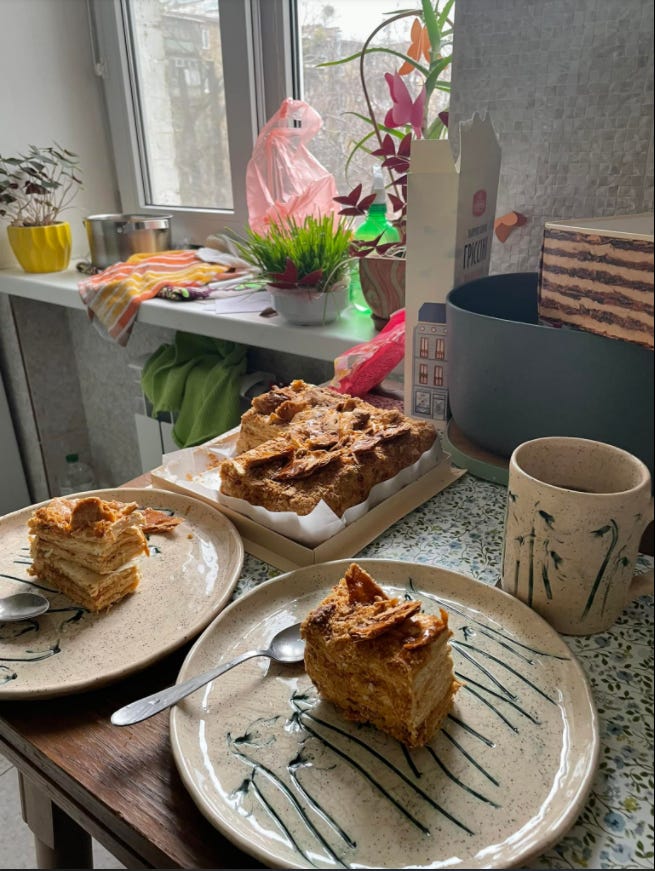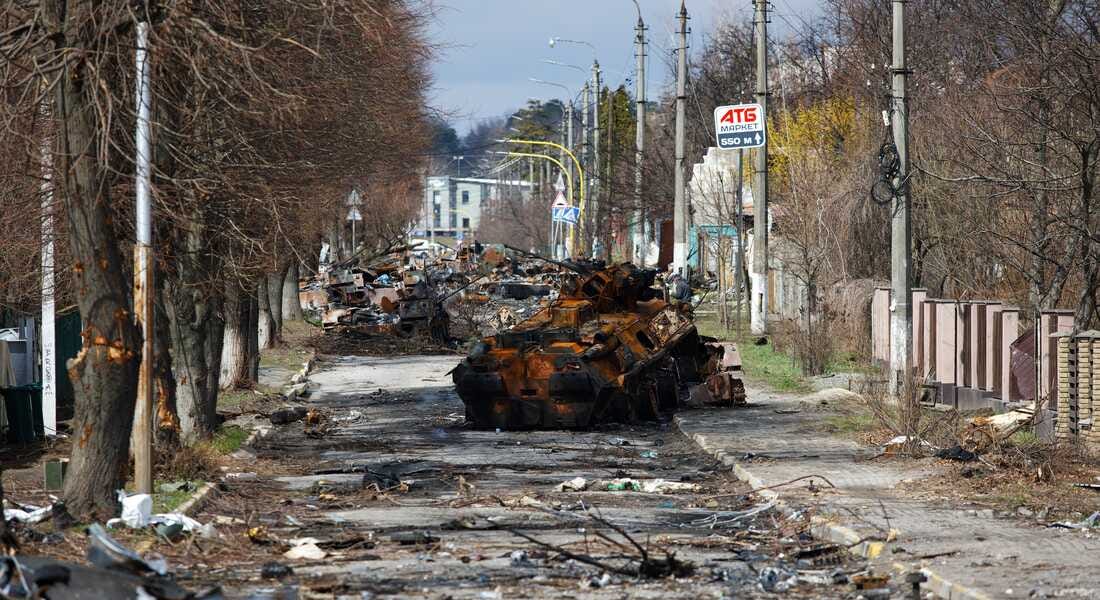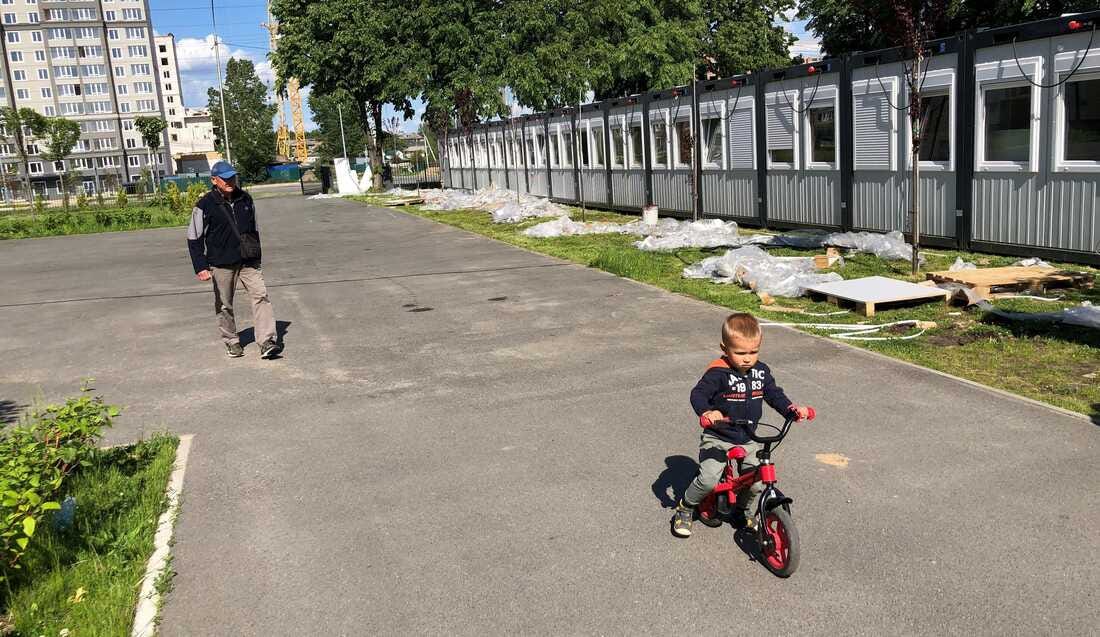"Angry as Fuck" ∙ Not My Boulder
WINS: land reclamation in South Puget Sound, northeast Washington, and Bucha, Ukraine
Angry as Fuck
Over three months ago, Russia invaded Ukraine.
Each time I sit down to write, it tugs on me, rendering me unable to write about anything else.
I’ve been fighting it. What can I say that hasn’t already been said?
It weighs on me. That’s all I can say.
It angers me. Much like it angered Ukrainian Oksana Potapova on the very first day when she posted the following on Facebook:
Update from Kyiv, 15:20, Feb 24th
After I realised that leaving the city today is an impossible task, I decided that I am staying here, at least for another day. Few minutes later I got a message from a friend and a brave human rights activist for women with disabilities Yuliia Sachuk who invited me to come over. I agreed immediately as I had all my stuff with me and did not want to be alone. I walked into a nearby store, bought a cake, and made my way there. And here we were, at noon on the day when full blown war started in our country, sitting in her kitchen, drinking coffee and eating cake. It felt surreal and calm at the same time.
Two hours later we started receiving the news that Russians will attempt to attack Kyiv, that their aim is government quarters. So we got up, took our backpacks and went to the nearest subway station which also serves as a bomb shelter. We’ve been here for the last 1,5hrs, and in the meantime anticipation of attacks on the capital increase.
I have never thought about what it would feel like to live through this. But I am calm, safe, and angry as fuck.
Greetings from Syrets metro station. Have some cake with us to our victory.

Each time that I read Oksana’s post with attention (rather than with an editing eye), I am brought nearly to tears. Everything I could write feels like not enough and too much.
I’ve been thinking about consent (Russia’s invasion is a violation of Ukraine’s right to self determination), imperialism (European nations have a history of colonizing countries around the world for material gain and power, so Western nations’ outrage about this is a bit hypocritical), war (I used to be mostly pacifist, but an anti-war viewpoint at this stage feels akin to opposing Ukraine’s right to exist), global inequalities (Western dollars are moving from addressing food shortages in Somalia, for example, to fund Ukraine’s defense, and I think sending money to Ukraine should be additive, not subtractive; additionally, there are plenty of wars or crises that Western media barely cover), and about how social justice and climate solutions are intertwined (40% of the EU’s 2021 gas consumption came from Russia; in order to reduce this reliance, the EU is scrambling to ramp up renewable energy in the long term, while purchasing gas from alternative sources for short-term needs).
The global situation and cycles of ongoing trauma are extremely complex and interrelated.
Not My Boulder; What Can I Do?
Russia invading Ukraine was like a giant boulder falling into a pond. The ripples reverberate around the world.
Although my housing, food, and personal autonomy is not at risk, I am like a tiny grass at the edge of a pond, and those ripples wash over me in waves of grief. We are all interconnected in relationship to the earth and each other, so of course a wounding of this magnitude has seismic waves that we can feel even in North America.
Below, I’ve included a somatic practice and a poem that have emerged as I process these events. I think they could be relevant in processing any systemic harm that is bigger than you are.
Not My Boulder
Imagine that you are a tiny grass at the edge of a pond. Perhaps the day is windy; a fish breaks the surface of the water. But overall, the surface is pretty smooth.
Suddenly, an enormous boulder hurtles into the water nearby, causing a giant splash and sending huge ripples outwards in all directions. The rings agitate in your direction. Imagine that the ripples are waves of grief from a heart wrenching and traumatic event.
As each wave washes over you, allow yourself to feel that grief. Imagine how the grass would move, tugged with a passing ripple, then sloshed back into place, tugged again, sloshed back. Physically move your body as if you are the grass.
As each ripple moves past, as you move your body in response, allow yourself to feel what you feel about it. Hold space for your emotions and offer validation and soothing.
Let your body take whatever shape feels expressive. Take as much time as you need to honor the emotions that move through you as you take this shape.
Next, observe the separation between the event of the boulder striking the pond and your position in the pond. Release the burden of solving the problem or any guilt for causing it. Say to yourself, “that is not my boulder.” Also, “that boulder is much bigger than I am.“ Release any story that you are morally responsible for the traumatic event that happened.
Acknowledge and comfort those parts of you that feel disappointed, powerless, overwhelmed. Acknowledge that the events are beyond your control, and that fact is heartbreaking. Hold space for these emotions for as long as feels helpful.
Finally, imagine the last of the ripples moving past you. The surface of the water stills. Relax your body. Allow your tension to dissipate from your body into the water around you. Relax your shoulders, and let your arms dangle. Notice if any tension has left your body. Take a deep breath or shake out any residual tension if it feels helpful.
What Can I Do?
Do what you can. And then let go: the grief, the moral responsibility; you didn't want this or cause it. Feel what you can. And then seek joy: take a walk, prepare good food, play. Practice consent: yes. no. And observe how that feels in your body: a release; a relief; a strong, cool breeze through the inner rooms of your soul.
Wins
In light of the newsletter’s topic, I’d like to celebrate moments of land reclamation — two Land Back stories and the story of a repossessed town in Ukraine.
Little Skookum Inlet
First, a story located in the South Puget Sound, northwest of Olympia. Last year, a family-owned lumber company, Port Blakely Companies, returned a two-mile stretch of beach-front property and 125 acres of tidelands to the Squaxin Island Tribe.
The company’s president, Mike Warjone, realized that land acknowledgement statements rang hollow while they held onto property where the Squaxin Island Tribe, “The People of the Water,” historically had access to tide flats and shellfish.
“Frankly I feel a little like, why didn’t we think of this earlier? It’s about time,” shared Warjone. “Both Port Blakely and our family owners recognize the cultural significance of this land to the Squaxin Island Tribe, land they were unfairly forced to surrender more than 150 years ago. We are grateful for the relationships we’ve built with the Tribal council and hope this agreement allows them to build a legacy for generations to come.”
Kris Peters, chairman of the Squaxin Island Tribe, says he and tribe members are excited to practice ceremony at the location. “It is a difficult thing to put into words, when we talk about our connection to the land. People look at it as a cliché, it is not…. I can’t wait to drum, and sing, and dance out on those beaches, just like our people did hundreds, and thousands of years ago. To me it is a very spiritual thing; it fills my heart.”
Tunk Valey
Next, to a story in near Spokane in northeast Washington, where a family ranch is transferring to the stewardship of the Colville Tribe. The Colville Tribe is actually 12 different nations whose people were forcibly moved and consolidated onto the Colville Indian Reservation in 1872.
Ernie Figlenski is a descendent of one family that moved west in 1904 to settle the newly available land. Generations later, Ernie Figlenski and his brother are the only remaining family, and Ernie didn’t want the 9,243 acre land to be sold piece by piece and developed. So he reached out to Conservation Northwest, a group that purchases land and then transfers ownership to an entity that promises to preserve it (this is usually done with a conservation easement, although the Colville Tribe preferred to sign a land-use covenant for more sovereignty than an easement allows).
Over many years, Conservation Northwest worked to raise $4.5 million to purchase the land and then transfer it to the Colville Tribe. The transfer was finalized in February 2021, and Ernie Figlenski died shortly thereafter. Ernie’s brother says he imagines Ernie died in peace and is “smiling down on us” because the ranch will be well stewarded.
This stewardship mentality is woven into Indigenous culture. “The Colville peoples have close connections with the land as a relationship rather than a resource,” writes Owen L. Oliver (Quinault / Isleta Pueblo) in an article that centers the Colville Tribe’s story. Oliver writes:
There is a larger movement to return land to Indigenous peoples—called Land Back. The phrase Land Back encompasses land, water and sky into a relationship held by community. By returning land back to the original people, it means the stewards are allowed to manage with the best sustainable outcomes for their people. These outcomes include but are not limited to the strengthening of harvesting traditional foods, diversification of economic opportunities, and the empowerment of identity. Cultural traditions like the annual Tribal Journey in the Pacific Northwest —when tribes engage in canoe traveling and potlatch culture—may not directly be seen as a Land Back movement, but through the reclamation of place and self-identity, Indigenous peoples continue to thrive in their usual and accustomed territories.
Bucha, Ukraine
And finally, a story of a city where Ukraine has pushed back Russian occupation. Not all Ukrainian cities are staying frozen in the wartime photos we’ve seen in the news. In Bucha, people are hard at work to clean up their city.

The government has set up pre-fabricated dorms where citizens can live as the city rebuilds.

Serhiy Leshchenko, an advisor to President Zelensky's administration, says that the Ukrainian government is very intentional in encouraging citizens to return and creating conditions for them to do so. "When people stay abroad, they start to set roots in the new society. Children go into local schools. Parents start looking for new jobs. And some stay abroad. People are starting to think about schools now, and they need to have a clear picture. The government has to show the ability to start the school season in three months."
Oksana Potapova (the “cake to our victory” lady) shared a post recently that synthesized the complexity I’ve been mulling over. She connected the seemingly different narrative threads so well (I’ve made editorial cuts for brevity; you can read the full post here):
I've been looking for a photo for a long time that can display all the materiality and at the same time metaphysicality of the evil that Ukraine is currently experiencing. These are fields in Kharkiv region covered with rips from Russian shells.
Right now, looking for ways to end this war, I hear [people say], "people are more important than territories." I've heard this since 2014 and couldn't formulate why I find this thesis manipulative. And now I realized: because it has the logic [either]/or that I avoid because it's binary logic, violence logic.
This is colonial, extractive logic. The whole exploitation of the planet is built on it —from mining digs to the capture of the territories of Indigenous peoples. The Indigenous peoples of North and South America, and many others, can tell you what it means to have the right to own their land, to have a deep, spiritual connection to her that colonizers or exploiters cannot break. So this picture is both about the Russia war now and at the same time about all the colonial alien wars, in which I see the war of humanity against the planet. It is in the violence on the ground, which I personally see [as] the root of many other forms of violence, including physical and sexual violence that the Russian army is now committing over the bodies of people in Ukraine.
And, in the end, this photo is about caring — about what it means to live on the land, feed on it, saturate the life of your communities, [to] care in return of the land that feeds you. It's about the right to food, to basic care for your own needs. It's all about our global (in)ability to care about each other.
They say this war is already changing the global world order. I hope this doesn't only mean a shifting of political elites, but a [shift] of the deep values on which our global community is built, including the colonial, binary thinking and the logic of violence, the logic of death. This war for me is about winning life over death, and not only in Ukraine.
[In response to the argument] "people are more important than earth," I will say: take a look at this photo. Those who do this to the earth will not regret any people. People and earth are equally important because they have a deep relationship of care and life.







Deep gratitude and thanks, Emily! The age of systems built on exploitation of people and planet enforced with physical violence is over. You write powerfully of the new way we are learning to be humans together on this beautiful planet. Thank you for the demonstration of self care as we walk together into a new era of thriving interconnection!